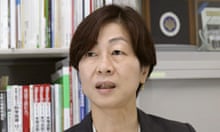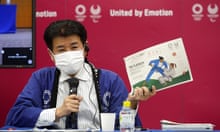The International Olympic Committee (IOC) has condemned derogatory remarks about women by the head of the Tokyo 2020 Games organising committee, Yoshiro Mori, as “absolutely inappropriate”.
The unusually strong intervention came after Mori complained last week that meetings tended to drag on because “competitive” women in attendance “talked too much”.
The 83-year-old former prime minister later apologised and retracted his comments while also attempting to justify them, inviting further criticism. On Tuesday hundreds of people who signed up to volunteer at this summer’s rescheduled Tokyo Olympic Games resigned in protest at Mori’s remarks.
The IOC said in a statement that Mori’s comments were “absolutely inappropriate and in contradiction to the IOC’s commitments and the reforms of its Olympic agenda 2020”. It added: “Besides Mr Mori’s apology, the Tokyo 2020 organising committee also considers his comment to be inappropriate and has reaffirmed its commitment to gender equality.”
More than 400 of the 80,000 people who signed up to volunteer at the Tokyo Games have resigned, according to local media, while an online petition calling for action to be taken against Mori had attracted more than 140,000 signatures by Monday. Olympic organisers said they had received more than 5,500 complaints.
“We are taking this very seriously,” the Olympic minister, Seiko Hashimoto, said on Tuesday morning when asked about the resignation of the volunteers.
Daichi Oyama, 28, who withdrew as a volunteer over coronavirus concerns, said Mori’s comments were proving “very embarrassing for Japan”. He said: “If every time he says something things get worse, he should quit.”
A poll at the weekend by Kyodo news agency found that almost 60% of people thought Mori was “unfit” to lead the organising committee, with just 6.8% saying he was qualified for the role.
The controversy has added to the myriad problems facing the IOC and Japanese organisers as speculation mounts over the future of this summer’s Games, which have already been delayed by a year because of the pandemic.
In a poll conducted shortly after the controversy erupted, 82% of those polled said the Games should be cancelled or postponed again, with just 14.5% saying they should go ahead as planned on 23 July.
The tennis player Naomi Osaka said Mori’s comments were “ignorant” but did not call on him to step down. “I don’t know in what situation he said those things, but I think it’s really uninformed and a bit ignorant,” she said.
Yuko Inazawa, a member of the Japan Rugby Football Union when Mori was chair, said she believed Mori’s “talkative women” remarks, in which he had referred his time there, had been directed at her. “I think conferences dragged on as I was asking questions from my standpoint as an amateur,” Inazawa, who became the first female board member of the JRFU in 2013, told Kyodo. “But that is absolutely not the same thing as saying women make conferences drag on.”
Mori may weather the storm, given the support he has among influential figures in the ruling Liberal Democratic party (LDP) and the IOC. He was a veteran LDP lawmaker when he became prime minister in 2000, but his approval ratings plummeted to 7% after a series of blunders and scandals involving cabinet ministers, and he was out of office just over a year later.
One senior LDP official said sacking Mori would mean losing the wealth of experience he had acquired since becoming head of the organising committee in 2014. “He is a walking dictionary of the Olympics and he knows everything about the last eight years,” the official said.
Mori’s relationship with the IOC president, Thomas Bach, is said to be one of “equals,” while Japan’s prime minister, Yoshihide Suga, has stopped short of questioning his suitability for the job. There are concerns that his resignation could hamper preparations for the Games at a crucial time, with less than six months to go before the opening ceremony on 23 July.
An organising committee source, referring to Mori’s testy encounter with reporters last week, said: “We had told him beforehand: ‘You can’t say anything about resigning’. Nothing good will come from replacing him.”
Kaori Yamaguchi, a judo champion and member of the JOC board, said many people believed Mori was untouchable. “I think it’s much easier for the IOC, it’s faster to work with a dictator,” said Yamaguchi, who was present at the JOC meeting where Mori made the remarks. “If Mori says OK, it means OK.”









